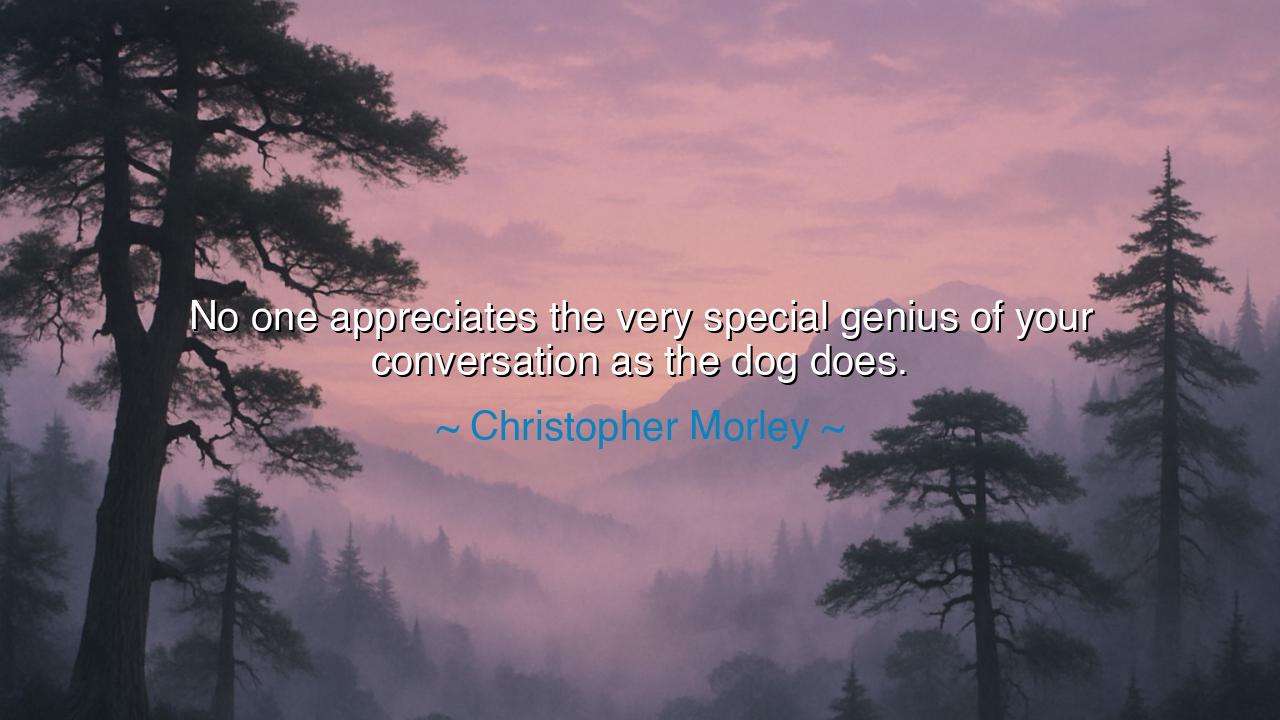
No one appreciates the very special genius of your conversation






Christopher Morley, poet and chronicler of human nature, once declared with warmth and humor: “No one appreciates the very special genius of your conversation as the dog does.” At first glance these words seem playful, but within them lies a profound truth about loyalty, companionship, and the quiet love that animals give to humankind. The dog, in its simplicity, teaches us that conversation is not always about words, but about presence, tone, and devotion. Where men may judge our speech, analyze our wit, or dismiss our ramblings, the dog hears only the music of our voice and responds with unwavering admiration.
The origin of this saying arises from the long bond between humanity and dogs, a relationship that stretches back thousands of years. In the hearth-fire days of our ancestors, when men first tamed the wolf, they discovered not only a guardian of their flocks but a friend of their hearts. Around the fire, as stories were told and voices rose into the night, the dog was there, listening—not with judgment, but with trust. Morley, with his keen wit, captured this eternal truth: that the genius of our conversation lies not in the brilliance of our words, but in the bond it creates with those who love us unconditionally.
To say the dog appreciates our conversation is to remind us that understanding does not always require comprehension. A dog does not grasp the intricacies of philosophy, the weight of politics, or the subtlety of wit. Yet it listens with patience, responds with devotion, and gazes with eyes that affirm: “Your voice is enough.” This is the secret Morley reveals: that appreciation is often greater in those who love us without condition than in those who critique us with sharp tongues.
History offers many examples of this truth. Consider President Franklin D. Roosevelt, weighed down with the burdens of the Great Depression and the Second World War. Amid his battles with nations and critics alike, he found solace in his Scottish Terrier, Fala. Newspapers and statesmen may have dissected his speeches with suspicion or hostility, but Fala listened to him with joy, responding not to the content of words but to the heart behind them. In such companionship, Roosevelt found comfort that no cabinet meeting could provide. Thus, the dog’s appreciation proved truer than the applause of crowds.
This truth extends beyond the bond between man and beast; it teaches us about the hunger of the human spirit. We long for listeners who do not judge, who do not seek to outdo or criticize, but who simply receive us as we are. In the dog we see the reflection of what we ourselves ought to be for one another: companions who value not only brilliance, but presence; who find genius not only in wisdom, but in sincerity.
The lesson for us is clear: we must learn to listen as the dog listens—without judgment, without impatience, without pride. For though we cannot understand every heart in words, we can show appreciation in presence. To honor someone’s speech, even when imperfect, is to honor their humanity. And in this practice, friendship deepens, love strengthens, and hearts are healed.
Practically, this means giving our attention freely. Put aside the distraction of haste and the pride of judgment. When a friend speaks, listen as though their words were sacred. When a child rambles in innocence, delight in their voice. When an elder repeats themselves, remember that their heart seeks not correction but companionship. In short, be to others the listener their dog already is—faithful, patient, affirming.
So let Morley’s words echo: “No one appreciates the very special genius of your conversation as the dog does.” Let them remind you of the humility and power of listening, the comfort of being received without criticism, and the sacredness of companionship. For if the dog, without reason, can love us enough to honor every word, then surely we, with reason, can learn to love one another in the same way.






AAdministratorAdministrator
Welcome, honored guests. Please leave a comment, we will respond soon